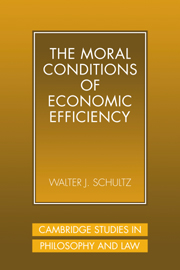The Moral Conditions of Economic Efficiency
Walter J. Schultz illustrates the deficiencies of theories that purport to show that markets alone can provide the basis for efficiency. He argues that markets are not moral-free zones, and that achieving the economic common good does indeed require morality. He demonstrates that efficient outcomes of market interaction cannot be achieved without moral normative constraints and then goes on to specify a set of normative conditions that make these positive outcomes possible.
- Schultz rigorously proves that Adam Smith's ideas regarding the relationship between morality and markets are mistaken
- Schultz shows that achieving and sustaining an economically efficient economy requires a moral right to welfare
- The book transcends interminable ethical debates regarding markets and morality by its reliance on an account of morality as a social practice
Product details
March 2011Adobe eBook Reader
9780511838224
0 pages
0kg
This ISBN is for an eBook version which is distributed on our behalf by a third party.
Table of Contents
- Preface and acknowledgements
- 1. Introduction and synopsis
- 2. A contextualized proof of the first fundamental theorem of welfare economics
- 3. The moral thesis: moral normative constraints are necessary conditions of pareto-optimal equilibrium allocations of commodities achieved through market interaction
- 4. A spontaneous order objection
- 5. The roles of normative constraints in relation to externalities
- 6. The moral conditions of economic efficiency
- 7. Implications
- Notes
- Bibliography
- Index.










